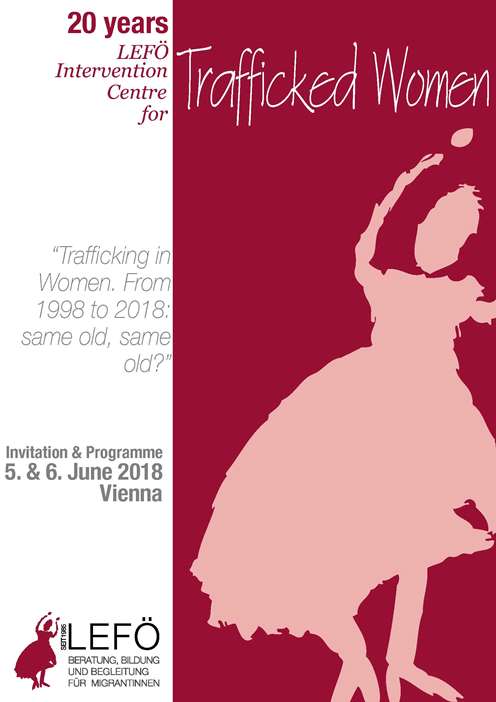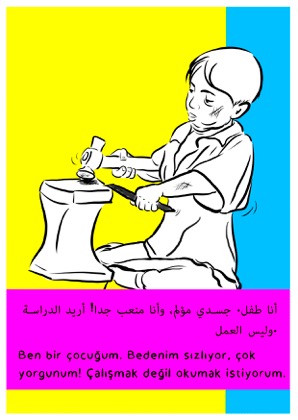E-Bulletin August 2018 - News from our member organisations
20th Anniversary of Intervention Centre for Trafficked Women (LEFÖ-IBF)

On 5-6 June, LEFÖ – Intervention Centre for Trafficked Women organised an international conference in Vienna entitled ‘Trafficking in Women 1998-2018: Same Old, Same Old’ to mark its 20th anniversary. More than 120 national and international experts discussed and analysed the developments and changes, or lack thereof, in the areas of human trafficking and labour migration, with a special focus on Transnational Referral Mechanisms (TRM) for safe and voluntary return. Participants highlighted that despite the progress made in many areas in the past twenty years, such as the introduction of new laws and structures, many trafficked persons fall through the cracks when it comes to rights protection, especially in the current anti-migrant climate in Europe and in Austria. Participants emphasised the importance of cooperation among all relevant stakeholders in order to guarantee that trafficked persons enjoy their rights effectively.
New Hong Kong Action Plan Falls Short of Human Rights Standards
The Hong Kong Government launched the Action Plan to Tackle Trafficking in Persons and to Enhance Protection of Foreign Domestic Helpers in March this year. It is a welcome first step, but its recent submission to the Hong Kong government, Justice Centre expressed concerns that the Action Plan’s effectiveness is limited by, inter alia, the lack of time frames for most new activities, the absence of a commitment to introduce anti-human trafficking legislation and the lack of information about granting immunity for prosecution to victims.
The Hong Kong Government claims that human trafficking is not prevalent in Hong Kong on the basis that it only identified nine victims in 2017. However, Justice Centre Hong Kong’s research Coming Clean estimated that 8,000 migrant domestic workers were trafficked for the purpose of forced labour. Two years has passed since Coming Clean was published and the Hong Kong Government never acknowledged the research. Justice Centre’s Head of Research Jade Anderson was invited by the Taiwanese Government to speak about Coming Clean in the 2018 International Workshop on Strategies for Combating Human Trafficking in July. We will continue to promote our research findings to contribute to evidence-based policy-making in Hong Kong.
Sex Worker Rights and Anti-Trafficking in Canada
On 23 March Supporting Women’s Alternatives Network (SWAN)-Vancouver appeared before the House of Commons Standing Committee on Justice and Human Rights. The Committee travelled across Canada in March to learn more about human trafficking in order to make recommendations that address the needs of people affected by human trafficking. SWAN submitted an additional brief, based on their 16 years of experience in supporting im/migrant sex workers, outlining how the current anti-trafficking responses increase the vulnerability of im/migrant sex workers while doing little to support trafficked women. The brief points out that the Protection of Communities and Exploited Persons Act (PCEPA), which criminalised most aspects of sex work, has instilled fear in im/migrants working in the sex industry, who are routinely arrested, detained and deported for engaging in sex work. ‘We receive calls from im/migrant sex workers who have experienced violence, exploitation and/or trafficking but these women are too afraid to contact law enforcement’, the brief states. SWAN highlights the particularly negative impact of ‘Operation Northern Spotlight’ which has deprived many sex workers of their income but failed to identify large numbers of trafficking victims, despite its huge financial resources. The brief ends with a number of recommendations to the federal government to improve anti-trafficking laws and to allocate more funding for sex worker rights organisations who are best positioned to detect cases of exploitation and trafficking in the industry, but receive no funding for it.

To promote a more respectful relationship between sex workers and the police, in May, SWAN launched its campaign ‘Building a Culture of Respect: Police and Sex Workers’, based on migrant sex workers’ experiences with police in 2017-2018. This campaign is targeted at police and focuses on the fundamental principle that is imperative in any interaction between police and sex workers – respect. It has three objectives: 1) to define respect in the context of police-sex worker interactions, 2) to raise awareness among police of the consequences of disrespectful language, treatment and actions, and 3) to provide an advocacy tool for sex workers and allies to prompt dialogue and encourage respectful interactions that in turn will increase sex workers’ access to justice. The campaign is funded by the Department of Justice Canada and is intended for organisations providing support to or alongside sex workers, particularly where they may interact with law enforcement. The infographic and webinar were distributed to national and international partners in a digital launch and can be accessed below.
Watch the project launch and download and share the SWAN Respect Infographic.
Online Tools for the Prevention of Labour Exploitation – Strategy manual
Migrant workers in the Netherlands are at risk of experiencing bad working conditions and labour exploitation. They are often not well informed about their rights or are deliberately misinformed by their exploiter in order to make them afraid and dependent. They have a weak negotiating position, are very often dependent on their exploiter due to debts, threats and violence and therefore find it difficult to escape.
For several years, FairWork has been experimenting with online resources to approach its target group, alongside its physical outreach work to provide information. As a result, clients are increasingly starting to find the organisation online.
This new manual is based on an analysis of this work. The manual provides useful tips for NGOs how to reach out to migrant communities in their country, for example, through Facebook groups, Google ad words, Instagram, website optimisation and cultural mediators, to inform them about their rights and where to seek help in case of rights violations. The manual outlines the steps to carry out baseline measurements, create attractive and engaging posts, advertise content, measure results and make adjustments.
Using these tools, FairWork noticed an increase of 350% in the number of views on their website. 25 cultural mediators from at least 15 different backgrounds work as volunteers at FairWork and provide information to their compatriots in different Facebook groups and online forums, such as Reddit. By combining online promotion with offline events, FairWork managed to reach 22,000 Spanish-speaking migrants in the Netherlands.
In December 2018 FairWork is organising a European expert meeting on this subject in Amsterdam. European civil society organisations can contact FairWork if they wish to receive an invitation to the event.
I am Still a Child
 The Human Resources Development Foundation (Turkey) developed a new campaign to raise awareness about child labour and child marriage among Syrian refugees in Turkey. The front side of these new materials depict situations of child labour and child marriage, with messages in Turkish and Arabic such as ‘I am still a child – I feel so tired of working’ and ‘I am still a child – don’t force me to marry’. The back side provides information about the relevant laws and regulations in Turkey that criminalise these practices.
The Human Resources Development Foundation (Turkey) developed a new campaign to raise awareness about child labour and child marriage among Syrian refugees in Turkey. The front side of these new materials depict situations of child labour and child marriage, with messages in Turkish and Arabic such as ‘I am still a child – I feel so tired of working’ and ‘I am still a child – don’t force me to marry’. The back side provides information about the relevant laws and regulations in Turkey that criminalise these practices.
The postcards are distributed in NGO-run community centres that provide services to Syrian refugees in the country.

